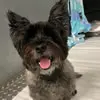Resources
Frequently Asked Questions

Years of Experience
About Us
Moving pets for decades.
Air Animal has great relationships with our clients and airline carriers around the globe. Our family-owned pet relocation service was founded in 1977 in Tampa, Florida, by Dr. Walter Woolf, a Florida Licensed and USDA Accredited Veterinarian. We have grown into one of the most comprehensive and well-respected pet shipping companies in the U.S.
Reviews
Clients say it best!

Cassie Aran
It was SO COOL to be able to bring my dog to three different countries in Europe! I would have NEVER been able to figure out the paperwork without the help of Air Animal. You guys SAVED THE DAY! Thank you for giving me the coolest experience with Sir Meatball EVER!

Won-Joo K.
Thank you SO much for your support and professionalism through this entire process! Not sure how we could have gone through it without your partnership through this stressful move.

Sree A.
Your hard work, perseverance, and collaborative spirit has helped Peppa to come home safely. It is because of your commitment and teamwork that we were able to achieve our goals and deliver outstanding results. I am deeply appreciative of the relentless determination you all have shown. Thank you for your contributions and for going above and beyond.

Sharron B.
The staff made my pet's move across the country a breeze with their kindness, efficiency, and professionalism. I can't thank them enough for all the help - they truly exceeded my expectations.

Casey S.
I am not exaggerating when I say that I literally would not have been able to manage this part of the move without your help, patience and incredibly fast turnaround time! It is so appreciated and I will be sure to recommend Air Animal to anyone who finds themselves in a similar situation.

Shaohong L.
Moved my dog from Texas to Hawaii. From beginning to the end, Cathy was extremely helpful and informative. Highly recommend using Air Animal to relocate pets overseas.

Kay S.
Jessica at Air Animal was extremely helpful and walked us through the entire process demonstrating care and compassion. We used Air Animal to take our dogs to the UK for a job assignment and based on the wonderful experience we had with them, they were the natural choice when it came time to come back to the US. They walked us through the process, were constantly in contact and always responding to our email silly questions. We HIGHLY recommend Air Animal to our friends and family.